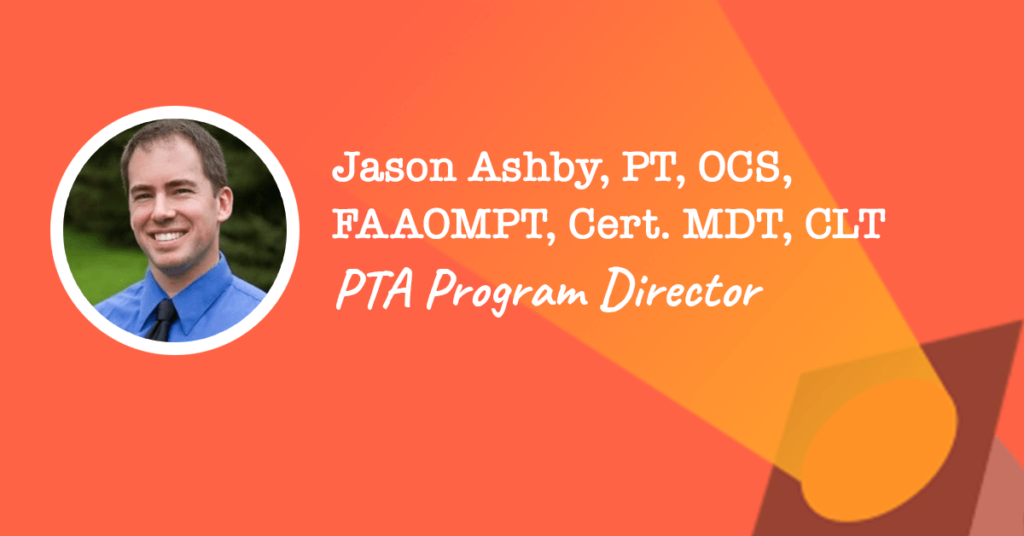Today’s non-clinical spotlight focuses on Jason Ashby, who went from physical therapist to PTA Program Director at Lakeland Community College.
This post may contain affiliate links or codes. This won’t increase your cost, but it helps keep TNCPT alive, and free of annoying ads! Thank you for your support. 🙂
What is your full name and title?
Jason Ashby, PT, OCS, FAAOMPT, Cert. MDT, CLT
PTA Program Director at Lakeland Community College

Where did you go to PT school, and what year did you graduate?
Cleveland State University, 2002. I am currently enrolled at Texas Tech University Health Science Center Doctorate of Science (ScD) program.
Where did you practice initially? What did you do next?
I started out working for the Cleveland Clinic, working as a float in a community hospital. I would go from Outpatient, to SNF, to inpatient Rehab, to acute; sometimes as many as 3 different settings in one day!
It kept me on my toes, but I didn’t get to see the patients progress, since I rarely saw the same patient more than once or twice.
I went on to work in outpatient orthopedics and home care for the next 11 years. I obtained my McKenzie Certification, then became a certified lymphedema therapist. During that time, I also became a fellow of AAOMPT, and then I obtained my OCS.
At what point did you decide you wanted to do something non-traditional, and why?
I remember taking a manual therapy course about 10 years ago, and some of the therapists there were talking about education, and how that would be their job when they were ready to get out of the clinic.
I remember thinking, “Who would ever want to teach? I just want to see patients!” However, after more years in the clinic and as a manager, I decided teaching could be interesting.
Did you immediately know you wanted to be a PTA program director, or did you consider other roles?
Actually, I was never planning on becoming a program director, I just started thinking about a physical therapy education career, and thought I really wanted to teach!
I applied to be a program director at my previous institution, thinking that they would hopefully hire me as an adjunct, or even full-time faculty (I thought they were going to promote from within, instead of hiring me as the program director).
As it turns out, they hired me as the program director! I was thinking, “Are they out of their minds?!?!”
However, thanks to a wonderful faculty and staff, I gradually learned the requirements of the position.
What made you choose PTA education vs. something else?
My long-term plan was to get into teaching at a DPT program, and get out of PTA education. I thought that being a PTA instructor would be a stepping stone into teaching at larger institutions.
As it turns out, I love PTA education! I also get to teach DPT students a hybrid program, so I get the best of both worlds!
Did you have to take any special coursework to land your role?
I taught at the school without any additional education.
However, there is now a lot of extra education that a PT or PTA must complete in order to become a PTA program director.
- You must have management and educational experience (working as a rehabilitation manager in the clinic, teaching CEU courses, or working as faculty in a program).
- You also need at least 9 college credits in educational foundations.
- You must also attend CAPTE workshops (although these are free to attend) in order to understand the programatic accreditation requirements.
How did you find out about your current job? Networking? Job posting?
A little bit of both. I saw the job posted on the institution’s website and Indeed.com. However, I also previously knew the provost, and one of my instructors from PT school was on the hiring committee!
Did you have to do anything special to land the job? Change up your resume, etc.?
In order to land a job in education, you need to show your educational background, and make your clinical background secondary.
You need to have a minimum amount of time in the clinic (and this will vary from state to state, due to state accreditation requirements).
Regardless, though, you will need to emphasize your education and management background.
What if someone doesn’t have any educational or teaching background, but want to pursue a role like yours?
If you are interested in teaching, but don’t have any educational background, I would strongly recommend teaching several CEU courses. If that isn’t an option, I would see if the any local PT or PTA programs are in need of a lab assistant.
At the very least, be a clinical instructor for PT/PTA students, and become an APTA certified clinical instructor. It is a great way to get experience with students, as well as gain familiarity with the PT/PTA programs that send students to your facility!
Is your role full-time or part-time? Do you still see patients as a PT?
PT and PTA program directors must be full-time. I see patients as a PT, but this is outside my full-time position. Some larger institutions are affiliated with hospitals, and you may have clinical time incorporated into your full-time teaching position.
Roughly speaking, what is a PTA program director’s salary?
Check out http://www.capteonline.org/AggregateProgramData/ for more information. CAPTE publishes salary data for all programs. It will vary considerably based on your experience, degree (entry-level degree vs. PhD or equivalent), and if you work for a public or proprietary institution. If you don’t have much experience in education, plan on a salary of less than you would make in the clinic.
What is a day in the life like for you as a PTA program director?
I spend about 1/3 of my time teaching classes, 1/3 of my time on accreditation duties, and 1/3 of my time on service. Service relates to service to the institution and to the profession. I spend time on committees within my institution (the hiring committee, education leadership committee etc.).
If you teach at a four-year/research institution, there will be a research component as well, termed a scholarship requirement. This is required for most tenure-track positions, but not all.
What are some of the pros and cons of the role?
Pros include seeing your students learn. It is pretty cool to see students go from knowing very little to becoming clinicians, and becoming vested in their careers and their profession.
Some of the cons include seeing a student fail. Some students will just not make it, despite your—and their—best efforts. Also, I can’t say the paperwork involved with accreditation is much fun.
If you think paperwork in the clinic is bad, just wait and see!
What are some of the similarities and differences you see between what you do now and what you did as a treating PT?
It is very interesting to compare the clinic and teaching—because they are nothing alike!
As a program director, I am responsible for hiring faculty.
Almost every single applicant says the same thing, “I teach every day in the clinic.”
I love hearing this, because that is our main job as clinicians—not just to give a patient exercises, or manual therapy, or gait training, etc. Our main job as PTs is to educate patients.
However, educating patients is nothing like educating students.
In didactic education, you must adhere to a syllabus, with specific educational objectives. The schedule is determined semester by semester. I need to be at my job for a certain amount of time each week, but it varies depending on the amount I am teaching. I have friends who are PTA program directors in other states, who don’t have to show up at work unless they are teaching or if they have meetings.
I once had a phone conference with another PTA program director who called me from the beach with her grandkids—she didn’t need to physically be at work, so she didn’t have to go in!
How does the school where you work usually advertise jobs?
We advertise on Indeed.com and Careerbuilder.com. I would strongly advise individuals interested in careers in education to join the APTA Academy of Education (formerly the Education section). Jobs are regularly posted there.
What are some of the ways being a clinic director and staff PT helped prepare you for your current role?
You need experience in management to prepare to be a program director in education, but the jobs are not similar.
It is true that you need to manage people, but I have not experienced the same challenges. The administrative portion of the job is much more difficult in education, but the managing of your staff—at least for me—is much easier.

PTs and PTAs may take jobs in the clinic for various reasons—usually for good reasons, but occasionally, you will have challenges. Not many individuals pursue a position as faculty unless they are dedicated to the profession, and genuinely care about the students. I have had some teachers that were not good, but they tend not to last very long.
Have you faced any judgment or nay-saying from leaving your clinical PT role? If so, how did you handle it?
Not very much at all. Occasionally, I will speak to a clinician who thinks I don’t know that much because I am “not in the clinic,” but I am in the clinic PRN, and the reason I have my current job is because I have quite a bit of knowledge and experience in physical therapy.
What type of growth is there as a PTA program director?
It really depends on where you are. In states like Texas, Florida, and Ohio, there are 22+ programs in each state, and the job market is extremely competitive.
In some other states, there are only a few programs, and there is a huge need for PTAs.
I would encourage anyone interested in a career in education to look at the amount of nearby programs, and do a job search for PTAs.
I personally am looking to pursue a faculty position in a DPT program.
Can PTAs land a role like the one you’re in, or is it just for PTs?
A PTA can become a PTA program director, but will need a minimum of a master’s degree, as well as 9 credits of educational foundations, as well as educational and management experience.
If you are a PTA and have the previously described education and experience, then you could be qualified to become a PTA program director.
Do you have any books, podcasts, coursework, or blog recommendations for the readers?
I don’t have anything to recommend right now. I am thinking about starting a Youtube channel to help clinicians interested in education, as well as to help students. Keep an eye out for “The Learning Physical Therapist” Youtube channel! (Cheesy, I know.)
Do you have any special advice for someone who is considering becoming a PTA program director?
Yes! Speak to faculty at local programs. Talk to the program directors. No two PTA program directors will have the exact same role—the type of institution will greatly effect the job requirements.
Before applying to the job, be sure you would be comfortable not working in the clinic, and sitting at a desk for long hours. It is an awesome job, but again, it is VERY different from a clinical role.
Lastly, if you do obtain a position, spend as much time from the outgoing director as possible. If that isn’t an option, the institution should have a consultant who is familiar with programmatic accreditation requirements and the role of the PTA program director. If they don’t have a consultant, insist they get one!
By the way, some institutions will have accreditation specialists. If they are not familiar with PT/PTA programs, you will need another mentor.
Also, if you are seriously considering becoming a program director, it is vital that you have a competent and reliable ACCE/DCE. I think the ACCE/DCE has a harder job than the program director!
Students spend roughly 1/3 of their time in the program in clinical education, and the ACCE/DCE has to coordinate all of that! Ensure that person has your full support!
Thanks for your insight, Jason!




